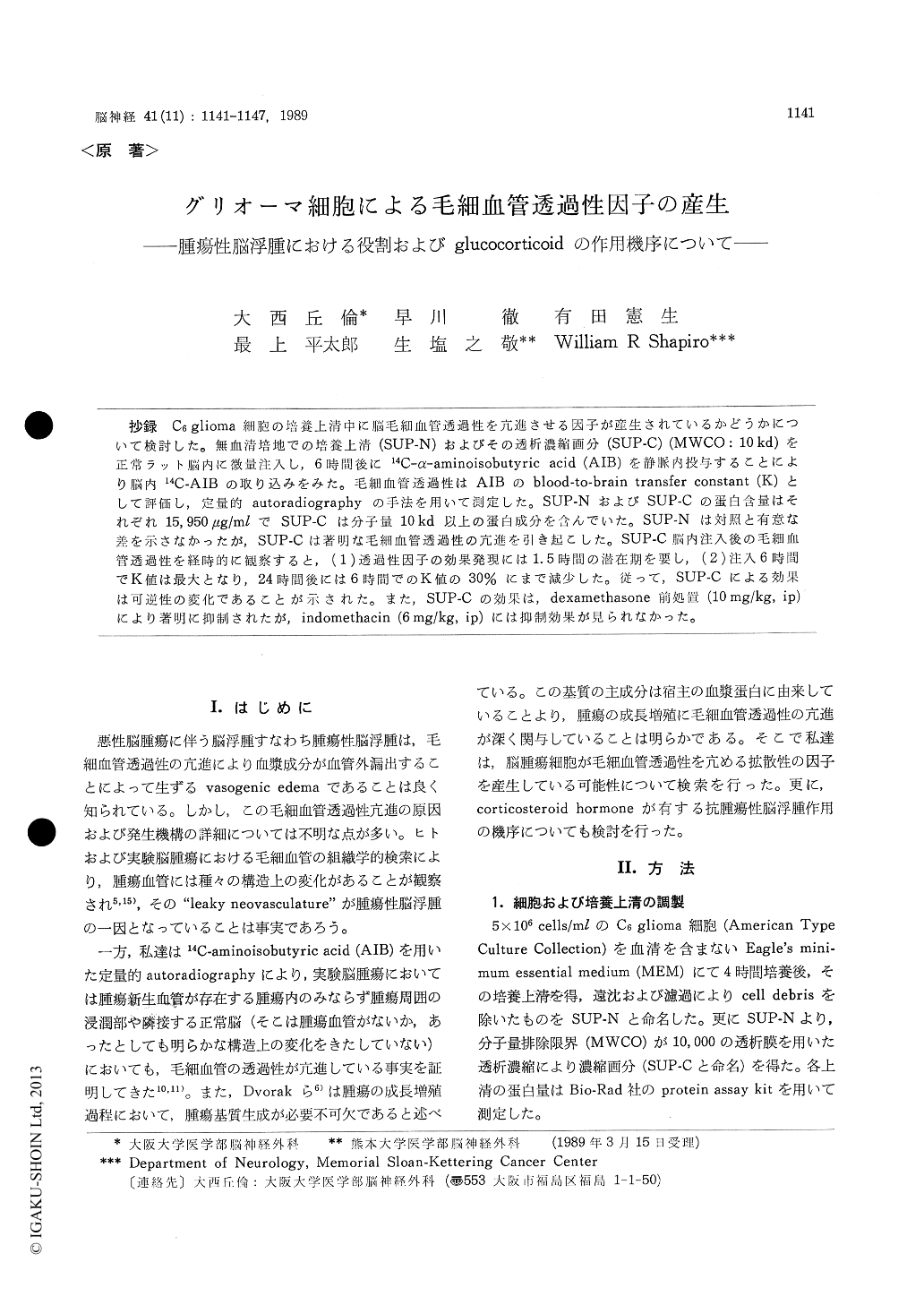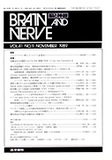Japanese
English
- 有料閲覧
- Abstract 文献概要
- 1ページ目 Look Inside
抄録 C6 glioma細胞の培養上清中に脳毛細血管透過性を亢進させる因子が産生されているかどうかについて検討した。無血清培地での培養上清(SUP-N)およびその透析濃縮画分(SUP-C)(MWCO: 10 kd)を正常ラット脳内に微量注入し,6時間後に14C-α-aminoisobutyric acid (AIB)を静脈内投与することにより脳内14C-AIBの取り込みをみた。毛細血管透過性はAIBのblood-to-brain transfer constant (K)として評価し,定量的autoradiographyの手法を用いて測定した。SUP-NおよびSUP-Cの蛋白含量はそれぞれ15,950μg/mlでSUP-Cは分子量10kd以上の蛋白成分を含んでいた。SUP-Nは対照と有意な差を示さなかったが,SUP-Cは著明な毛細血管透過性の亢進を引き起こした。SUP-C脳内注入後の毛細血管透過性を経時的に観察すると,(1)透過性因子の効果発現には1.5時間の潜在期を要し,(2)注入6時間でK値は最大となり,24時間後には6時聞でのK値の30%にまで減少した。従って,SUP-Cによる効果は可逆性の変化であることが示された。また,SUP-Cの効果は,dexamethasone前処置(10mg/kg,ip)により著明に抑制されたが,indomethacin (6mg/kg,ip)には抑制効果が見られなかった。
We studied whether C6 glioma cells produce a diffusible factor that increases capillary permeabi-lity of rat brains. Culture supernatant after 4 ho-urs' incubation of C6 glioma cells in serum-free medium was obtained (SUP-N). SUP-N was con-centrated 80-fold by dialysis-concentration (MW cut off was 10 kd) (SUP-C). These two supernat-ant fractions were tested for capillary permeability activity by their infusion into normal rat brains (right caudate-putamen). Control materials (MEM or concentrated MEM) were also infused into the left caudate-putamen as well as supernatants. Ca-pillary permeability was measured by a quantita-tive autoradiographic method with 14C-aminoisobu-tyric acid (AIB) and expressed as an unidirectional blood-to-brain transfer constant (K). Effects of in-fusates were quantitatively estimated by two para-meters, i. e., the highest K value (Kmax) (Ati/g/min) and the spatial extent (D1/2) (mm). The protein concentration of SUP-N and SUP-C was 15 and 950 respectively. SUP-N showed a slight increase of capillary permeabilty, particularly, aro-und the needle track (infusion site) in the brain, but it was not significantly different from the con-trol on the value of Kmax. On the other hand, SUP-C markedly increased capillary permeability (Kmax ; SUP-C : 10. 83±0. 99, control : 2. 53 ± 0. 22, p<. 001) and the effect was much more extensive than that of SUP-N (D1/2 ; SUP-C: 2. 23±0. 26, SUP-N : 0. 83±0. 07). A factor in SUP-C increased capillary permeability after a lag phase of L5 hours reaching the maximum after 6 hours of infusion, and 24 hours later the effect declined to 30% of Kmax at 6 hours. Pretreatment of dexamethasone (10 mg/kg, ip) 1 hour before SUP-C infusion signi-ficantly inhibited the increase of capillary perme-ability (Kmax) induced by SUP-C, but pretreat-ment of indomethacin (6 mg/kg, ip) did not. On the other hand, the spatial effect of SUP-C on ca-pillary permeability was not altered by either de-xamethasone or indomethacin pretreatment. These results indicate that C6 glioma cells produce a pro-tein factor of molecular weight more than 10 kd which increases capillary permeability of normal rat brain. Corticosteroid hormones inhibit the ef-fect of the factor possibly at the level of capillary endothelial cells not through inhibiting the synthe-sis of prostaglandins.

Copyright © 1989, Igaku-Shoin Ltd. All rights reserved.


